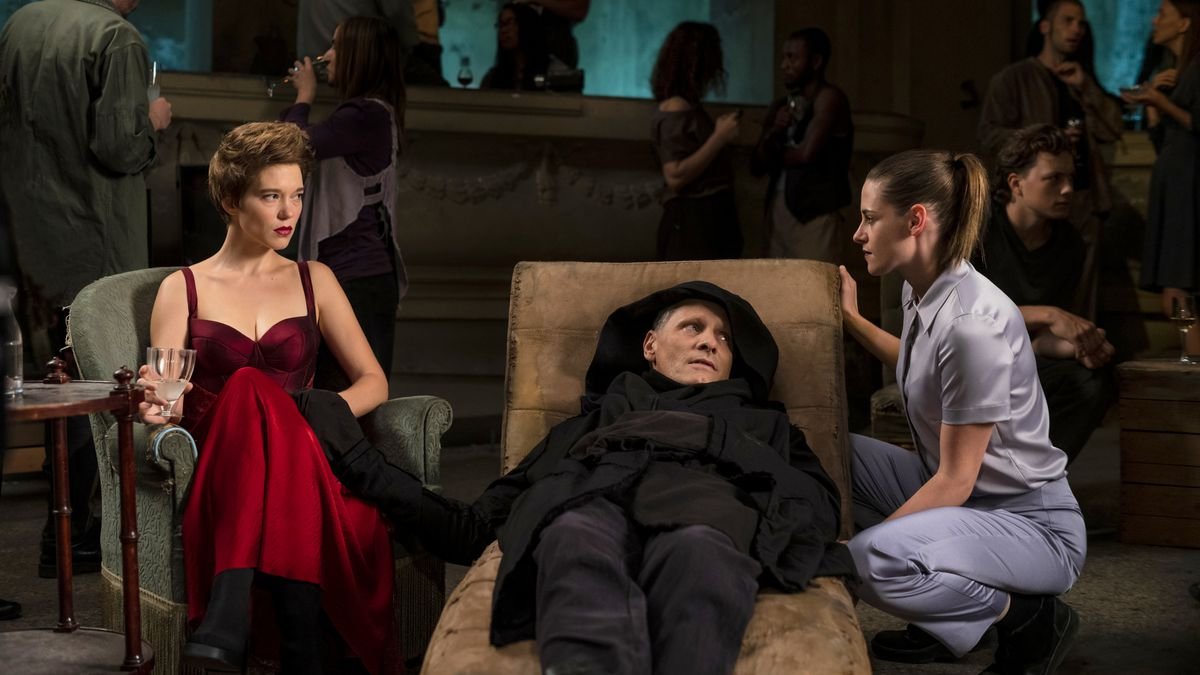‘Crimes of the Future’ Review
I experienced an odd feeling watching Crimes of the Future. It wasn’t my squeamish reaction to the various scenes of bodily mutilation. That much I expected. What I didn’t anticipate was a strange combination of satisfaction with a master filmmaker returning to his roots and indifference towards those roots in the first place. I found myself admiring the disgusting production design and intricate world-building, but left the theater feeling empty, an outcome I’ve experienced before with some of director David Cronenberg’s previous work.
Crimes of the Future finds Cronenberg returning to the silver screen after an eight-year absence and re-entering the horror/sci-fi genre after an even longer leave. With this film, he introduces us to a dystopian future where pollution and climate change have significantly altered human physiology. New organs pop up within the body every day, most people can no longer feel pain, and a select few dine on nothing but plastic. This ghastly environment gives way to a new type of performance art where people conduct horrific surgeries on their mutated bodies.
To go into the film’s plot would be missing the point. There’s some business surrounding an underground group of plastic eaters trying to shed light on a conspiracy, but this storyline is secondary to the relationship between performance artists Saul Tenser (Viggo Mortensen) and Caprice (Lea Seydoux). A professional and romantic couple, their act involves removing the numerous vestigial organs growing in Tenser’s body. Their craft is the film’s cornerstone as it causes every character to engage in philosophical discussions on the nature of art and human evolution.
These twisted performance pieces remind you why Cronenberg is still the king of body horror. Even when he’s pushing 80, he manages to get under your skin with grotesque production design and practical effects. All the Cronenberg signatures are on display in the form of fleshy, organic tech and a blurred line between mutilation and sexuality. “Surgery is the new sex,” poses nervy bureaucrat Timlin (a disarmingly funny Kristen Stewart). While that concept is nothing new to Cronenberg, it makes a compelling thesis for this world.
My main hang-up with the film is one I have with similar Cronenberg films like Videodrome and eXistenZ: the body horror and world-building take the place of a compelling story or genuine character drama. The lack of an emotional journey leaves me cold, and while the hideous practical effects and charged social commentary pique my interest, I feel no desire to revisit these worlds. I respond more to films like The Fly and A History of Violence, where the violence draws out an emotional response from the characters, whether it’s horror or familial strain.
As engaging as Saul and Caprice are, I never felt a sense of stakes in their relationship. Mortensen and Seydoux have such great chemistry, and I wanted them to have more to work with. There are a few points where the film comes close to testing their relationship and way of life, but you never feel like any conflict will stick. Oral sex with someone’s internal organs is fun, but the absence of an emotional or ideological wedge caused me to lose interest.
Lang Dotrice (an excellent Scott Speedman) is one potential opportunity for emotional weight. He suffers a tragic loss when his wife euthanizes their mutated son, and his arc revolves around proving his son was born naturally with his mutations. This revelation would not only reshape the world as everyone knows it, but it would also provide Dotrice closure on his son’s death. But the film treats this storyline like an afterthought, and the climactic revelation comes off like a shrug.
Despite my lack of personal investment, I got a lot out of Crimes of the Future. The nasty visuals are a sight to behold, and each piece of deranged performance art leaves you curious about what else the film has in store. Mortensen and Seydoux are compelling leads, with Mortensen giving his best performance in years. His labored breathing and crooked body language give off the impression of someone whose body is rebelling against them. He projects confidence through his physical weakness, and his dry delivery perfectly fits the film’s comedic tone.
I’m glad this film exists. I’m genuinely happy for the hardcore Cronenberg fans who’ve been craving this kind of movie from him for over two decades. I’ve been lukewarm on his most recent output, but I’ll always find his voice and point of view fascinating. But I might look towards his son, Brandon, for shocking, exciting new art since Possessor was one of my favorite films in 2020.
★★★
